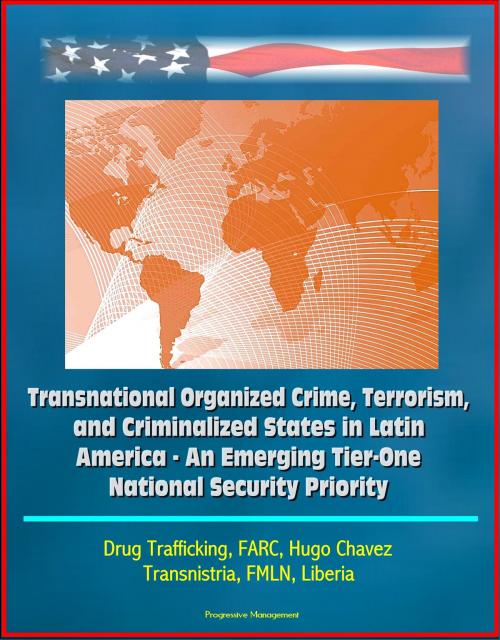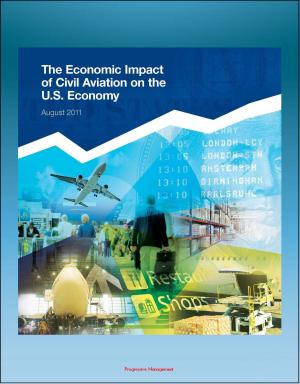Transnational Organized Crime, Terrorism, and Criminalized States in Latin America: An Emerging Tier-One National Security Priority, Drug Trafficking, FARC, Hugo Chavez, Transnistria, FMLN, Liberia
Nonfiction, Social & Cultural Studies, Political Science| Author: | Progressive Management | ISBN: | 9781301907106 |
| Publisher: | Progressive Management | Publication: | February 18, 2013 |
| Imprint: | Smashwords Edition | Language: | English |
| Author: | Progressive Management |
| ISBN: | 9781301907106 |
| Publisher: | Progressive Management |
| Publication: | February 18, 2013 |
| Imprint: | Smashwords Edition |
| Language: | English |
In July 2011, President Obama unveiled his Transnational Organized Crime Strategy, the first comprehensive national policy effort to articulate and combat illicit economies that, cumulatively, have grown to more than $1 trillion. Although quite serious, this ever-increasing problem garnered relatively little attention. The security challenges and the geostrategic environment left few resources to monitor, much less combat, transnational organized crime (TOC) organizations. Across the globe, TOC groups continued to grow in power, influence, and resources, as President Obama's strategy indicates. The George W. Bush administration's initial focus on the problem during its last few years in office, ultimately led to the Obama strategy.
Over the past decade, the International Assessment and Strategy Center (IASC) has maintained a focus on TOC issues and the growing ties between traditional criminal structures and various terrorist organizations. Extensive IASC field research documented the following developments: (1) the changing nature of TOC organizations in Latin America and West Africa; (2) the growing hybrid nature of criminal and terrorist groups; (3) the alliances with regional and extra-regional state and nonstate actors; and, (4) the growing involvement of the self-proclaimed Bolivarian states of Latin America whose governments sanctioned criminal activities as part of coherent, multistate instruments of statecraft.
This monograph synthesizes research on such criminalized states in Latin America. It documents how, through the growing alliance with Iran and other external actors, these governments have developed a clearly articulated view hostile to the United States. That view also adopts a military doctrine of asymmetric warfare that embraces the use of weapons of mass destruction. The associated doctrine is further underpinned by a small group of intellectuals who articulate a need for radical Shi'a Islam and the armed, revolutionary Left to unite in order to defeat the United States — a message that has been welcomed by Bolivarian states.
Taken together, the emergence of criminalized, strongly anti-American governments in the Western Hemisphere, in alliance with Iran and other states who sponsor terrorist organizations and consider the United States to be the Great Satan, now represent a tier-one threat to the security of the U.S. Homeland. This monograph offers a template for examining similar developments in other parts of the world, as well as recommendations on how to begin to confront the emerging threat. The first step in the long process of dealing with a multifaceted set of enemies with unlimited resources is to understand the nature of that threat.
Subjects covered include: MRTA, Mapuches, ETA, Bolivarian- Iranian Ties, Carlos the Jackal, drug trafficking, human trafficking, money laundering, FARC, Hugo Chavez, WMD, FMLN, Bolivarian revolution, Transnistria, Charles Taylor, Liberia.
In July 2011, President Obama unveiled his Transnational Organized Crime Strategy, the first comprehensive national policy effort to articulate and combat illicit economies that, cumulatively, have grown to more than $1 trillion. Although quite serious, this ever-increasing problem garnered relatively little attention. The security challenges and the geostrategic environment left few resources to monitor, much less combat, transnational organized crime (TOC) organizations. Across the globe, TOC groups continued to grow in power, influence, and resources, as President Obama's strategy indicates. The George W. Bush administration's initial focus on the problem during its last few years in office, ultimately led to the Obama strategy.
Over the past decade, the International Assessment and Strategy Center (IASC) has maintained a focus on TOC issues and the growing ties between traditional criminal structures and various terrorist organizations. Extensive IASC field research documented the following developments: (1) the changing nature of TOC organizations in Latin America and West Africa; (2) the growing hybrid nature of criminal and terrorist groups; (3) the alliances with regional and extra-regional state and nonstate actors; and, (4) the growing involvement of the self-proclaimed Bolivarian states of Latin America whose governments sanctioned criminal activities as part of coherent, multistate instruments of statecraft.
This monograph synthesizes research on such criminalized states in Latin America. It documents how, through the growing alliance with Iran and other external actors, these governments have developed a clearly articulated view hostile to the United States. That view also adopts a military doctrine of asymmetric warfare that embraces the use of weapons of mass destruction. The associated doctrine is further underpinned by a small group of intellectuals who articulate a need for radical Shi'a Islam and the armed, revolutionary Left to unite in order to defeat the United States — a message that has been welcomed by Bolivarian states.
Taken together, the emergence of criminalized, strongly anti-American governments in the Western Hemisphere, in alliance with Iran and other states who sponsor terrorist organizations and consider the United States to be the Great Satan, now represent a tier-one threat to the security of the U.S. Homeland. This monograph offers a template for examining similar developments in other parts of the world, as well as recommendations on how to begin to confront the emerging threat. The first step in the long process of dealing with a multifaceted set of enemies with unlimited resources is to understand the nature of that threat.
Subjects covered include: MRTA, Mapuches, ETA, Bolivarian- Iranian Ties, Carlos the Jackal, drug trafficking, human trafficking, money laundering, FARC, Hugo Chavez, WMD, FMLN, Bolivarian revolution, Transnistria, Charles Taylor, Liberia.















